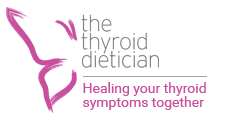One of the most common complaints I hear from newly diagnosed Hashimoto’s patients is, “I feel like I am going crazy.” The truth is, anxiety, panic attacks, and depression are a few of the most common symptoms when the body is attacking itself.
When I had no clue about the connection between the mind and having hypothyroidism, I honestly felt like I belonged in a loony bin. One day I would feel as high as a kite, other days even the slightest bit of stress seemed like a mountain, some days were filled with paranoia, and others I would fall into a deep depression.
This is what I love about studying functional medicine. It has helped me to understand that each organ in the body does not live in a vacuum. The entire body works together and when there is inflammation, it affects the entire body, including the brain.
In a 2014 study comparing a euthyroid population (euthyroid means that the thyroid is not destroyed yet) with Hashimoto’s Thyroiditis had a significantly higher prevalence of depression and panic disorder as compared to the placebo group without Hashimoto’s Thyroiditis.(1)
According to Dr. Izabella Wentz, a functional medicine expert in thyroid disease, a 2004 study found that having high antibodies and having anxiety go hand in hand and if there is a slight reduction in thyroid hormone secretion, this could also cause anxiety.
As an autoimmune thyroid patient, it is so important to realize that you are in fact NOT going crazy and that this is simply your body’s way of letting you know that there is ongoing inflammation in your body.
The good news is that there are many things that you can try to help reduce anxiety:
Stop the caffeine.
I know this may come as bad news for most people, but too much caffeine can definitely be adding to your anxiety. It can interrupt natural cortisol production and drive you further into adrenal dysfunction (where you over- or under- produce cortisol at various times of the day and night). This disturbs your sleep pattern and contributes to a vicious cycle of not sleeping enough, feeling exhausted throughout the day, eating foods that cause inflammation, and causing more anxiety.
A study from 2016 showed a strong correlation between teenagers that regularly consume caffeine and an increase of anxiety-related behavior in adulthood even if they stop drinking caffeine before they are adults!! (2)
Recommendation: As everyone is an individual and coffee can have different effects on different people, I suggest to stop drinking coffee for 3 weeks. For the first 3-4 days you may have issues like headaches, however, making sure to take some magnesium can lessen the severity of the headaches. After the 3 weeks, start reintroducing coffee, one cup a day, to see how it affects you. If your sleep starts to get interrupted and you start feeling more anxious, you know that coffee is not for you. You can try drinks with less caffeine like green tea instead.
Improve your gut health.
Did you know that 70 percent of your feel good hormone, serotonin, is produced in the gut by good bacteria? That’s right, as your second brain, your gut is responsible for producing a large amount of hormones that dictate how we feel. If you have dysbiosis (in other words, you do not have enough good species of good bacteria versus bad bacteria in the gut), intestinal permeability or leaky gut, or you have symptoms of small intestinal bacterial overgrowth or other infections from parasites or fungus, then there is a good chance your mood will be impacted negatively.
In order to ensure a more even mood, getting rid of all processed foods and including more whole, organic foods will help to improve your mood. Excluding inflammation-causing foods like gluten, conventional dairy, and sugar can also vastly improve mood and help to alleviate issues such as headaches, brain fog, and decreased concentration.
In order to feed your good bacteria, it is important to eat the colors of the rainbow at every meal. An example can be a salad made of lettuce and spinach (green), tomatoes (red), purple cabbage (dark blue), shredded carrots (orange), and yellow peppers (yellow). This will ensure that you are getting the right amount of fiber to feed your good bacteria so that they can help to improve your mood.
I have seen it a ton of times in practice. When I work with clients to get rid of the overly-processed diet that they are used to eating and replace their meals with real, whole foods, one of the first comments I hear in the second appointment is, “I don’t feel as anxious as I used to.”
If you do not have issues with SIBO (small intestinal bacterial overgrowth) or histamine intolerance, eating fermented foods like sauerkraut or coconut water kefir can also help to improve gut health and mood.
Optimize Your Thyroid Medication.
Just as different people react differently to different foods, the same can be true with medication. Many people take a synthetic form of thyroxine, which can have several excipients inside like lactose that can decrease the absorption of the medication. Also, there are others that have issues with transforming thyroxine into the active form of thyroid hormone, free T3. In this case, supplements like iron, zinc, and selenium can be given or additional T3 medication can be given. Some people can do well on a synthetic blend of T4 and T3, some do better with natural dessicated thyroid, and some do better with a compounded formulation of both T4 and T3. In any case, it is very important to work with a doctor that is open to all these options in order to help you find what works best for you.
And side note…remember that many Hashimoto’s patients do not produce enough stomach acid. Stomach acid is needed to absorb your thyroid medication optimally. Therefore, working with a functional medicine practitioner to optimize your stomach acid is also an important step to take in order to absorb your thyroid medication.
Try Adaptogenic Herbs.
Ashwaganda (Withania somnifera)
Ashwaganda, also known as Indian ginseng, is an adaptogenic herb known to decrease symptoms of stress.
In animal studies, ashwaganda counteracted the symptoms associated with extreme stress, including changes in blood sugar, adrenal weight and cortisol levels. (3,4). It also decreased symptoms of depression and anxiety-associated behaviour. (5) Ashwaganda is being studied as a means to counteract stress stemming from chemotherapy and radiation therapy. Results look promising in that the herb stimulates stem cell proliferation and improves red blood cell, white blood cell and platelet parameters. (6,7)
Since Ashwaganda seems to have a calming effect, it is recommended to take this supplement before bedtime.
Rhodiola rosea
Rhodiola rosea is another adaptogenic herb that is known for its ability to affect hormones like serotonin, dopamine and norepinephrine.
In a double-blind, randomized, controlled trial, sixty subjects with stress-related fatigue were given a standardized proprietary Rhodiola rosea product (576 milligrams of Rhodiola rosea) or placebo in two daily doses (morning and lunchtime) for twenty-eight days. The Rhodiola group experienced improved concentration associated with decreased stress related fatigue and significant decreases in salivary cortisol compared to the placebo group. (8)
Other studies have shown Rhodiola to improve fatigue and mental performance in physicians on night duty as well as improved physical fitness, psycholomotor function, mental performance and general well-being in students. (9,10)
Licorice (Glycyrrhiza uralensis)
Licorice may work synergistically with cortisol. In other words, this may be an ideal herb for people who do not produce enough cortisol. (11)
Since licorice can boost cortisol production, this supplement is best taken in the morning when cortisol levels should be at their highest.
Holy Basil Leaf
Holy Basil leaf is another herb that is documented for its stress-relieving, neuroprotective and cognitive enhancing effects in animal studies.
In a human study , participants given 300 milligrams of Holy Basil extract over thirty days saw marked improvement in cognitive function as well as salivary cortisol levels. (12)
Phosphatidylserine (PS)
Phosphatidylserine is a phospholipid found in cells that plays an important role in muscle metabolism and immune function. It has been shown to balance cortisol overproduction, especially following intense exercise. Several studies done on male athletes showed that PS decreased the production of cortisol after intense exercise. (13,14)
Tyrosine
Tyrosine is an amino acid that is a precursor to neurotransmitters such as dopamine and norepinephrine. Stress causes the depletion of these neurotransmitters. This is associated with a stress-induced performance decline in animals. Supplementing with tyrosine will reduce the decline of dopamine and norepinephrine and can improve performance in times of stress. (15)
Your Are Not Going Crazy
If panic attacks have appeared to come out of nowhere or you are more anxious about things without good reason, it is time to check your thyroid function and antibodies. Anxiety and mood swings are the body’s way of telling you that something is going wrong. The good news is that there are a myriad of things you can do within your power to get your mood back to normal.
References
- Ayhan, M.G., Uguz, F., Askin, R. and Gonen, M.S., 2014. The prevalence of depression and anxiety disorders in patients with euthyroid Hashimoto’s thyroiditis: a comparative study. General hospital psychiatry, 36(1), pp.95-98.
- O’Neill, C.E., Newsom, R.J., Stafford, J., Scott, T., Archuleta, S., Levis, S.C., Spencer, R.L., Campeau, S. and Bachtell, R.K., 2016. Adolescent caffeine consumption increases adulthood anxiety-related behavior and modifies neuroendocrine signaling. Psychoneuroendocrinology, 67, pp.40-50.
- https://www.ncbi.nlm.nih.gov/pubmed/10075127
- https://www.ncbi.nlm.nih.gov/pubmed/9582008
- https://www.ncbi.nlm.nih.gov/pubmed/18476388
- https://www.ncbi.nlm.nih.gov/pubmed/?term=Kuttan+G.+Use+of+Withania+somnifera+Dunal+as+an+adjuvant+during+radiation+therapy.+Indian+J+Exp+Biol+1996%3B34%3A854-856.
- https://www.ncbi.nlm.nih.gov/pubmed/8866726
- https://www.ncbi.nlm.nih.gov/pubmed/19016404
- https://www.ncbi.nlm.nih.gov/pubmed/11081987
- https://www.ncbi.nlm.nih.gov/pubmed/10839209
- http://www.altmedrev.com/publications/14/2/114.pdf
- https://www.ncbi.nlm.nih.gov/pubmed/26571987
- https://www.ncbi.nlm.nih.gov/pmc/articles/PMC1997116/
- Monteleone P, Beinat L, Tanzillo C, et al. Effects of phosphatidylserine on the neuroendocrine response to physical stress in humans. Neuroendocrinology 1990;52:243-248. 89.
- https://www.ncbi.nlm.nih.gov/pubmed/1599383




